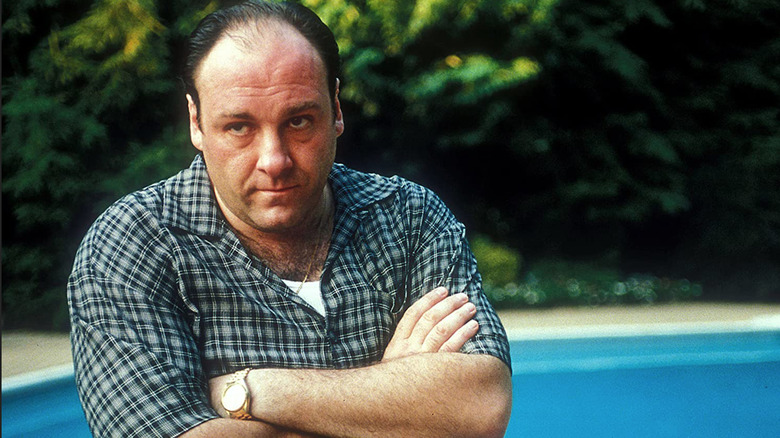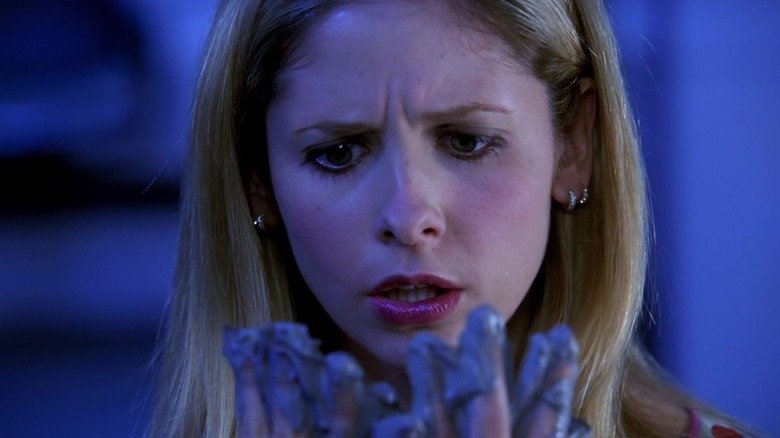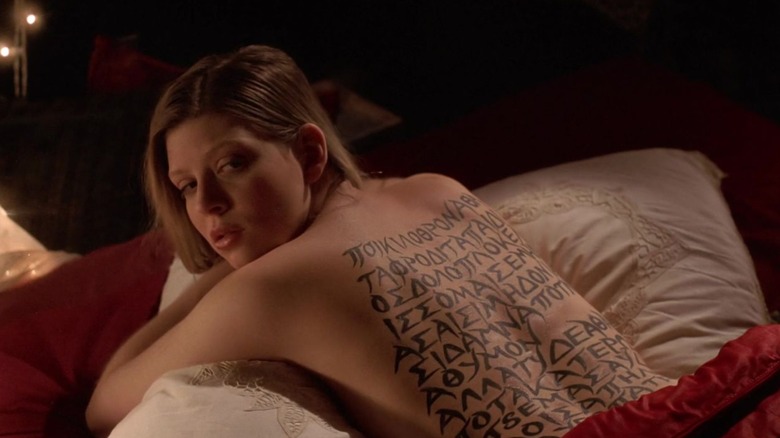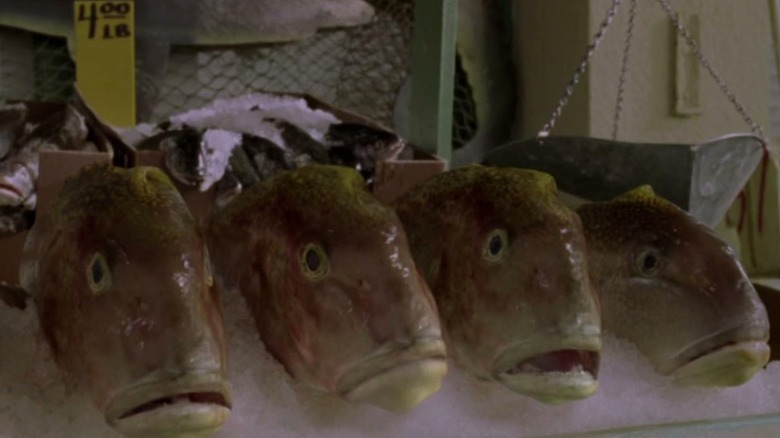In Spring 2000, Buffy The Vampire Slayer And The Sopranos Somehow Had The Same Season Finale
"It was all a dream." The now-cliched narrative device has been used in countless TV twist endings over the decades, from the series finale of the sitcom "Newhart" to a classic "Twilight Zone" episode about a man who fears he'll die if he sleeps. The soap opera "Dallas" once deleted a whole poorly received season with a dream twist, and last year the series finale of "Atlanta" put its own fresh spin on the classic "all a dream" ending.
TV has always been obsessed with dreams, but the dreams we see on TV aren't always reflective of the bizarre, topsy-turvy world of real-life dreams. It's surreal, then, that in the year 2000, two of TV's most talked-about shows, "The Sopranos" and "Buffy the Vampire Slayer," both dropped dream-heavy season finales that dug into their protagonists' psyches — all while adhering to delightfully wonky dream logic.
Two surreal detours take center stage
"Buffy the Vampire Slayer" wrapped up its fourth season with "Restless," a bizarrely anti-climactic (yet still rewarding) dream coda that came after the resolution of the season's main plot. In "Restless," the Scooby gang faced off against the First Slayer, a prehistoric woman named Sineya (Sharon Ferguson) who haunted their dreams after discovering that Buffy (Sarah Michelle Gellar) wasn't working alone. Ultimately, "Restless" is about the strength that comes from Buffy's sense of collaboration, friendship, and love, which sets her apart from past slayers. Yet most of the episode is deliriously unintelligible, as it takes place within the kooky dreamscapes of Buffy, Giles (Anthony Head), Xander (Nicholas Brendon), and Willow (Alyson Hannigan).
A dream-heavy episode of "The Sopranos" wasn't exactly new for David Chase's show, which often allowed mafioso Tony (James Gandolfini) to work things out in his resting state that his angry little brain couldn't sort through in the daytime. But season 2's "Funhouse" is perhaps the strangest of the dream episodes. It slides from Tony's weird, food-poisoned fever dreams to reality and back again with no firm line between the two states, making much of the episode disorienting. When Tony does dream, his mind makes him confront the fact that his friend Pussy (Vincent Pastore) is a snitch, a truth he finally faces head-on when he kills the man by episode's end.
Warnings and premonitions
"Funhouse" and "Restless" have a lot of differences — the former hinges on a dream yet possesses a solid structure, while the latter is almost entirely made of dream scenes — but they also have tons of similarities. If you tuned into must-watch TV in spring 2000 ("Funhouse" aired in April, "Restless" in May) you'd see two shows interrogating their main characters' pasts and nudging them towards a particular future in a near-clairvoyant way. While Buffy's dreams include coded allusions to Dawn (Michelle Trachtenberg), a character who wouldn't appear until the next season, Tony dreams of odd, rhythmic sounds that are called to mind again later in his waking life, when something on the boat he boards to kill Pussy begins tapping in the wind.
The pair's dreams also serve a problem-solving purpose, both for the characters and series writers who had to get Tony and Buffy from point A to point B. The dreams tell the protagonists who not to trust, albeit through silly, roundabout means. Tony sees Pussy appear as a fish on ice, and the talking sea life inspires Tony to finally face the fact of Pussy's betrayal. The FBI informant ends the episode quite literally sleeping with the fishes, as Tony, Silvio (Steven Van Zandt) and Paulie (Tony Sirico) toss him overboard after killing him. Buffy, meanwhile, runs into her boyfriend Riley (Marc Blucas) at Initiative headquarters, where he tells her he's making plans for world domination. This foreshadows Riley's own mini-villain arc, as he ultimately leaves the show in season 5 after he becomes a thrill-seeking weirdo who recklessly slaughters vamps — while also paying them to suck his blood.
Life is but a dream
The two episodes also explore the surreality of dreams in a similar way. Both shows feature dream sequences in which characters speak with an off-kilter cadence (several characters in "Buffy" do this, while Tony's dream features an all-time-great oddball line reading from Van Zandt), moments of tonal mismatch, strange background noises or music, and scenes in which one character suddenly turns into another. Two insecure male characters — Xander and Tony — also have inappropriate sex dreams about people with whom they don't have a sexual relationship in real life. In Tony's case, he finally hooks up with Dr. Melfi (Lorraine Bracco) in her office, while Xander dreams that Buffy's mom (Kristine Sutherland) comes onto him.
"Restless" (which was written by series creator Joss Whedon) and "Funhouse" (written by Chase and Todd A. Kessler) were both original ideas that happened to debut within weeks of one another. While "Restless" references "Apocalypse Now" and "The Pillow Book" and imagines a trippy production of "Death of Salesman," Tony's dreams are surprisingly pop culture-free, aside from the literal sleeping fishes, a nod to "The Godfather." Buffy and her team are faced with dreams that spend more time working out their insecurities than telling them any real truth, while Tony's unconscious mind is focused on just one issue.
Yet both episodes subvert viewer expectations by devoting precious finale time to unreal scenarios that mimic the feeling of a dream perfectly. Both also leave their main characters with a stronger sense of self, for better or worse. And for a few hours in the spring of 2000, both episodes put a complex, prestige TV spin on a classic trope of the medium. For a few gloriously weird moments, it really was all a dream.



